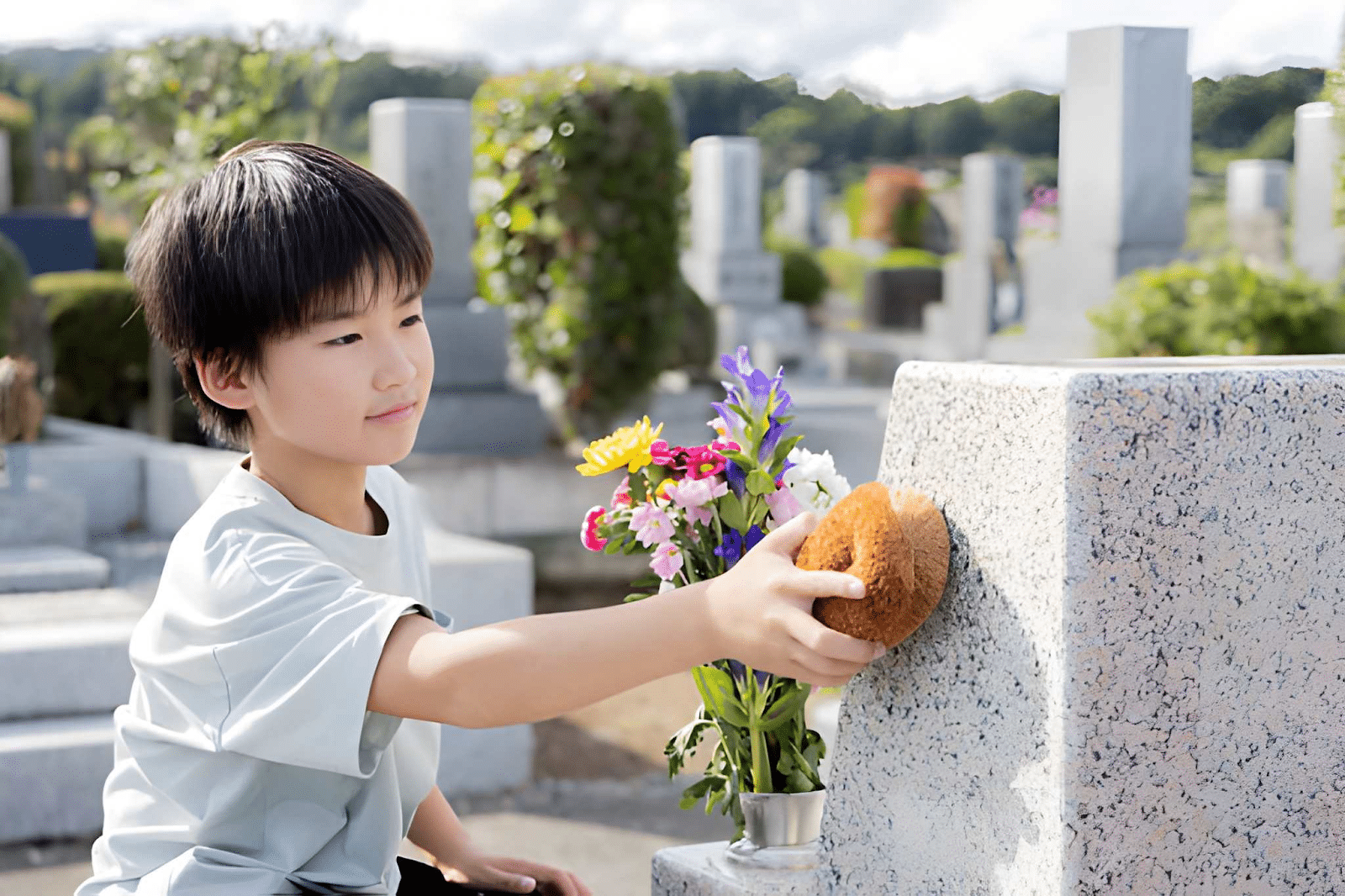How To Help Children Cope With Grief: A Guardian’s Role
While school teaches many things, there are very few opportunities for a child to learn about their emotions and how to deal with them in their academic studies. As children grow up, they will inevitably encounter many scenarios that bring them joy, but also some that bring them sorrow.
This could come in the form of something a little less severe – like a broken toy or losing a competition – but there will unfortunately also be times when they have to bear with something bigger and more complex, like the passing of a loved one.
While grief is a natural response to loss, it can be a difficult and confusing experience for younger ones to navigate. When it comes to the death of a pet or a figure of importance in their lives, it is crucial for the guardians to identify, support and address it.
According to the Children’s Grief Awareness Day website, nearly 8% of children in the U.S. will suffer the loss of a sibling or parent by the time they’re 18. It is believed that those 3 years old and below won’t have the cognitive development yet to comprehend the impact, and thus can be protected from the effects of grief, but guardians should look out to observe and render support to those older than that.
As a guardian, you must step in and take over an important role. When children are experiencing grief and loss, it’s essential for you to recognise, support, and help them through it. Be there for them. Give them hugs and comfort whenever they need one. Most importantly, be open and listen. We’ll discuss more about a guardian’s role as we go along in this blog.
Grief and Loss for Children

(Source: Freepik)
Understanding child bereavement is essential. Hence, before taking on this important responsibility, you must first understand how children grieve. By informing yourself about how kids grieve, you can better navigate this difficult process.
Unlike grown-ups, kids grieve in a different way. Their understanding of death changes as they grow. Younger children might not fully grasp that death is permanent. They may ask many questions and need repeated explanations. Their grief might show through behaviours like clinginess, regression in skills, or changes in sleeping and eating patterns.
As children get older, they start to understand the permanence of death and its impact. They might experience a range of emotions such as sadness, anger, confusion, or even guilt. School-age children often express their grief through play or drawing and may have trouble concentrating at school. They might also worry about their own safety and the safety of other loved ones.
That said, kids often turn to play while grieving because it provides a natural outlet for expressing and understanding their emotions. Play creates a safe space where they can explore their thoughts and feelings without feeling overwhelmed. They use their imagination to act out scenarios related to their loss. This gives them a sense of control and comprehension.
Plus, play serves as a distraction from their grief. Offering moments of relief from intense emotions and allows them to connect with you for comfort and support.
Children may also experience delayed grief. This is where they don’t feel the full impact of a loss immediately. Mainly due to their lack of understanding about death at a very young age. Instead, these feelings may surface much later. Sometimes months or even years after the loss.
When delayed grief arises, it can be triggered by reminders of the loss or significant life events. Such as birthdays, holidays, or significant milestones that the kid would have shared with the loved one they lost.
Teenagers have a more adult-like understanding of death but still need support. They might struggle with intense emotions and feel isolated in their grief. Teens might not want to talk about their feelings and prefer to spend time with friends. It’s important for you to offer a listening ear and reassure them that their feelings are normal and it’s okay to grieve.
Signs And Symptoms of Grief in Children

(Source: Freepik)
While grief is experienced differently across individuals due to their temperament, environment, culture and age, there are some signs that are worth looking out for that indicate serious signs of grief and an inability to cope with it.
Here are some common children’s grief symptoms that you need to look out for:
Emotional Signs
- Sadness or crying
- Anger or irritability
- Anxiety or fear
- Guilt or self-blame
- Confusion or shock
Behavioural Changes
- Withdrawal from friends and activities
- Clinginess or needing more attention
- Acting out or disruptive behaviour
- Regression to younger behaviours (e.g., bedwetting, thumb-sucking)
- Changes in sleep or eating patterns
Cognitive Symptoms
- Trouble concentrating or remembering things
- Asking repeated questions about the loss
- Difficulty making decisions
Physical Symptoms
- Headaches or stomach aches
- Fatigue or low energy
- Changes in appetite or weight
Social Symptoms
- Isolation from peers
- Reluctance to attend school or social events
- Difficulty relating to others
How To Approach And Support The Child: Helping Kids Cope with Grief and Loss

(Source: Freepik)
Helping children cope with grief requires patience and compassion. understanding their unique developmental needs and providing them with emotional support. In this article, we will provide expert advice on how to support children as they navigate the grieving process.
Validate Their Feelings
One crucial way to support grieving children is by acknowledging and accepting their emotions. Instead of shielding them from negative feelings, encourage them to openly express their emotions. Provide a safe space for them to talk and process their grief.
Let them know it’s normal to feel sad. Assure them you’re available to listen and support them whenever they’re ready. By actively listening without judgement, you can help them feel understood and supported during this difficult time.
Encourage Them To Express Their Feelings
Encouraging children to express their feelings doesn’t have to involve talking. You can help them express their emotions through art, play, or other activities they enjoy. Or any medium that they’re comfortable with.
These indirect methods can address the aspects that are hard to put into words. Like adults, children can find relief in these activities, and we can offer them guidance to do so.
Give Them Comfort and Reassurance
During times of grief, children need to feel safe, loved, and understood. Giving comfort and reassurance involves offering caring support, hugs, and verbal reminders that their feelings are normal and okay.
It’s also important to reassure them that they are safe, as well as the loved ones around them. Being there for them every step of the way helps them feel supported and reassured. Allowing them to express their emotions and seek help when needed.
Keeping To Routine And Structure
Routine and structure can bring comfort. Some children may find it helpful if you maintain it to a certain extent. Keeping a regular schedule can offer stability amidst uncertainty and change. Include consistent bedtimes, meal times, and daily tasks. Keep it simple and predictable, as doing so can help children adjust more smoothly.
Discuss About Grief and Loss
Explaining death to kids can be a little hard. As discussed earlier, young children’s understanding about death is limited. Hence, it makes grief and loss for children different from adults. Kids will have questions about death and the grieving process.
It’s important for you to give concrete, direct, and clear answers to their questions. Encourage them to ask questions when the timing seems right. Let them know that it’s okay to be curious and look for answers. Be open and honest about the topic.
You can use these opportunities to introduce coping skills to them. Like picking up physical activities or sharing more with those they feel comfortable with. You can also take this time to reassure the child with reminders that they are not abandoned or forgotten after the loss of a loved one. Keep telling them they are loved and supported. Let them know that the deceased will always be remembered, and the child’s love will continue to honour them even though they’re gone.
Be Patient
Being patient is crucial when helping children through grief and loss. Grieving is a complex and individual process that takes time. Children may need more time than adults to understand and express their feelings.
It’s important to give them the space and time they need to navigate their emotions at their own pace. Patience involves listening carefully, offering comfort, and being understanding of their changing moods and behaviours.
Demonstrating patience fosters a supportive environment where children feel safe and encouraged to share their feelings without feeling rushed or judged.
Provide Space For Their Own Memorialisation
Funerals often focus on adult traditions and customs. So it’s beneficial to let grieving children have their own way of remembering the deceased. This can help them feel a connection to their loved one. Bringing a sense of closure through a tribute that suits them.
They could plant something. Maybe make a memory box or album. They can even have a special spot to leave flowers for the deceased whenever they want.
Seek Support For Yourself
Remember to address your own grief. Supporting a grieving child can be emotionally demanding. So, take time to step back and assess your own emotional state and limits. Seeking support for yourself is crucial. Talk to your friends, family, or a counsellor to help manage your feelings.
As an adult, you need to be a role model for children. Demonstrate what healthy grieving looks like. By taking care of your own emotional well-being, you can better support the child and show them how to navigate their grief in a positive way.
Grief Therapy Techniques for Kids

(Source: Freepik)
Grief therapy for children often uses different methods suited to their age, development, and specific needs. Some effective techniques include:
Play Therapy
Children often express themselves through play. So, play therapy allows them to communicate their feelings, thoughts, and experiences in a safe and non-threatening way. Therapists may use toys, art materials, or sand trays to ease expression and exploration of grief-related themes.
Art Therapy

(Source: Freepik)
Art therapy provides children with a creative outlet to express their emotions and process their grief. Through drawing, painting, or sculpting, children can express their inner experiences and better understand their emotions.
Narrative Therapy
Narrative therapy involves helping children construct and share their personal stories of loss and grief. By sharing their experiences through storytelling, children can feel more empowered and in control of their own story. This helps with healing and building resilience.
Expressive Writing
Writing can be a powerful tool for children to express their thoughts, feelings, and memories related to their loss. Some examples are journaling, writing letters, or creating poetry. Doing so provides a structured way for children to process their grief and find meaning in their experiences.
Mindfulness and Relaxation Techniques
Mindfulness practices can help children manage stress and regulate their emotions during times of grief. Examples include deep breathing exercises, guided imagery, or progressive muscle relaxation. These techniques promote self-awareness, emotional regulation, and a sense of calm.
Group Therapy
Group therapy enables children to bond with peers facing similar losses and exchange experiences in a supportive setting. Group activities, discussions, and support from peers can offer validation, normalisation, and a feeling of belonging for grieving children.
Parent-Child Interaction Therapy
Being included in children’s therapy sessions has a lot of benefits. It can strengthen family connections, enhance communication, and create a supportive space for children to share their grief. Engaging in activities together, having discussions, and developing coping strategies as a family can boost the child’s sense of security and resilience.
Reading
Literature is often used to introduce and educate children about grief and loss. It is also a useful tool to help children cope with and process grief. Books offer a safe and structured way for kids to explore emotions and learn coping strategies through the stories. By engaging with stories of resilience and hope, children find comfort and validation, gradually working through their feelings of loss and sadness.
When To Seek Help

(Source: Freepik)
Grief looks different for each child because of their personality, surroundings, culture, and age. However, there are some signs that a child might be having a hard time coping, such as:
- A prolonged period of depression where they lose interest in school, daily activities, and events they usually enjoy
- Withdrawing from friends and family for a long time
- Trouble sleeping or eating well
- Prolonged fear of being alone or clinginess
- Regressing to behaviours younger than their age for an extended period, such as bedwetting
- Blaming themselves for the loss or expressing a wish to join the deceased
- Excessive imitation of the deceased in behaviour or speech
- Believing they are talking to or seeing the deceased for an extended time
- A significant drop in school performance
When you notice these symptoms, it’s time to get help. It could be a sign that the child is experiencing “Prolonged Grief Disorder” (PGD). PGD is a disorder where children struggle to cope with grief and loss. PGD is sometimes known as “complicated grief”.
It happens when a child (or adult) experiences intense, prolonged symptoms of grief that interfere with their daily functioning and well-being. These symptoms persist for an extended period beyond what is considered normal. It’s characterised by persistent yearning, preoccupation with the deceased, and difficulty moving on with life after the loss.
Final Thoughts
Supporting a child through their grief requires a caring and understanding approach. By keeping these points in mind, you can assist a child in navigating their grief and finding a path to healing that suits them.
Since each child is different and will cope with grief in their own way and time, it’s important to keep communication open and offer support whenever they need it. Hence, allowing them to move forward in a healthy manner.
Dealing with grief can be challenging, and if you ever need help, Memorial Funeral offers resources to support you with any end-of-life matters. Don’t hesitate to contact us.









